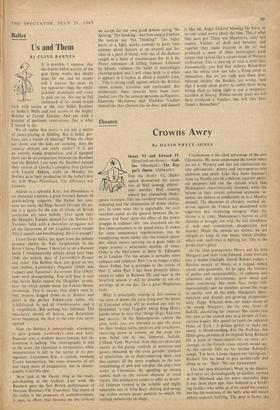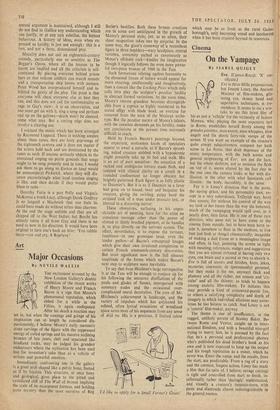Theatre
Crowns Awry
By DAVID PKVCE-JONES
Henry VI and Edward IV.
(Stratford-on-Avon.) — Gali- leo. (Mermaid.)—The Beg-
gar's Opera. (Aldwych.) FOR his Henry VI, Shake- speare dramatised the narra- tive of Hall (among others): now another Hall (among others) has dramatised Shake- speare in return. This has involved much cutting. reshaping and the elimination of minor charac- ters. In some ways this is regrettable, for such vanished scenes as the quarrel between the ar- mourer and Peter show the effect of the power struggle in ordinary life: but anecdotes are the first time-consumers to be pared away. It makes for some unnecessary regularisation, too, by compressing more scenes into the council cham- ber, which means carrying on a great table to argue around a wearisome number of times. Gone is the Parliament at Bury St. Edmunds or at London. Yet the action is certainly more compact and coherent. Part 1 is no longer a play about Talbot, but a prologue to the events of Part 2, while Part 3 has been properly abbre- viated to usher in Richard Ill, and later in the Stratford season it will be possible to see the tetralogy all in one day, like a great Wagnerian cycle.
What is principally missing in this version is the sense of doom, the curse lying over the house of Lancaster which will be worked out only by bloodshed, 'a true Tragedie' which King Henry knows when he says that 'things ill-got had ever bad success.' In the Shakespearian scheme the great lords, too, are intended to pay the price for their broken oaths, perjuries and treacheries, clattering down in armour on the stage like trees felled one by one, Somerset, Suffolk, Clifford, York, Warwick. Now they are presented merely as the greedy symbols of ambition and power, thwarted by the even greedier symbols of absolutism. In so depersonalising them, and this appears all the more emphatic in the new streamlining of plot and sub-plot, the plays now revert to Chronicles. By speeding up certain scenes, such as the various disputes of royal claims, this production comes to offer us histori- cal tableaux framed in the suitable and highly adaptable sets of John Bury, shifting and swing- ing within certain gaunt patterns to match the stylised manoeuvres on stage.
Clarification is the chief advantage of the new Chronicles. We must understand the lowest when we see it. Mystery and fate are rationalised out into self-interest : poetry and introspection into ambition and pride. Like this, Janet Suzman's Joan La Pucelle can be a hell-cat used for politi- cal purposes and not the sluttish witch that Shakespeare chauvinistically invented, while the barons in their strictly polarised economic in- terests can behave as predictably as in a Marxist manual. The decencies of chivalric warfare ob- served against the French are abandoned with eagerness and increasing savagery when the throne is at stake. Shakespeare's horror of, civil disorder is brought out with the full bloodiness of stab and counterstab, decapitation and murder. ,When the swords are drawn, we are obliged to keep in our heads which kinship, which side, each man is fighting for. This is the production's glory.
So the chief protagonists, Henry and his wife Margaret and their rival Edward, come forward into a feudal limelight. David Warner makes a Russian moujik of Henry in a ragged, belted smock and gumboots. As he ages, the mixture of pathos and contemptibility, of unfitness and • reluctance and perseverance, grow more and more convincing. His weak face twists self- depreciatingly and he slouches across the stage in apathy. and all the while Margaret's deter- mination and despair are growing proportion- ately. Peggy Ashcroft does not make much of the young Margaret, the sly sexy lover of Suffolk, calculating her chances. She comes into her own in the second play as a blower of Lan- castrian bugles. Her speech to taunt the captured Duke of York : 'I prithee grieve to make me merry' is blood-curdling. For the Yorkists, Ian Holm gives promise of an original King Richard Ill, a kind of manic-depressive, un friste per- wattage, as the French crime reports would say. As the curtain falls on his brother Edward's words, 'For here. "hope, begins our lasting joy,' Richard lifts his head to grin sardonically and shrug at us: 'Huh.' We arc forewarned.
This has been Historian's Week in the theatre, so I move on chronologically to Galileo, revived at the Mermaid and far more successful than it was three years ago. Joss Ackland is a brawl- ing Galileo who looks as if he cared for science but has the weakness of the bully who will recant before superior bullying. The pace is faster, the central argument is maintained, although I still do not find in Galileo any understanding which can justify, or at any rate subtilise, the human behaviour. A history of ideas, even when ex- pressed so lucidly, is just not enough: this is a two, and not a three, dimensional play.
Morality does not suit an eighteenth-century comedy, particularly one so sensitive as The Beggar's Opera, where all the lessons to be learnt are implied and all the criticism is self- contained. By placing everyone behind prison bars so that redcoat soldiers can march outside and a transportation ship looms with menace, Peter Wood has overproduced himself and in- hibited the gaiety of the play. The point is that everyone will cheat everyone else as best they can, and this does not call for sentimentality or rage in Gay's view: it is an observation, and one must get on with it, sing a song and perhaps end up on the gallows—death won't be cheated. come what may. But a cutting edge does not involve a clearing axe.
I enjoyed the music which has been arranged by Raymond Leppard. There is nothing sombre about these tunes, they are lusty pop-songs of the eighteenth century and it does not matter if the actors hold back and are dominated by the tunes as such. If anyone seriously objects to the restrained singing on purist grounds that songs ought to be sung properly and in tune, I would ask them to go along to Enrico or (and would be unnecessary) Pickwick, where they will dis- cover excruciatingly what loud tuneless singing, is like, and then decide if they would prefer blare to taste.
Dorothy Tutin is a pert Polly and Virginia McKenna a brash Lucy, although Derek Godfrey is so languid a Macheath that one feels he could have made do without either dear charmer. At the end the stage unfolds and they are all shipped off to the West Indies; but Brecht has already taken it all from Gay and there is no need to bow in his direction. It would have been original to turn one's back on him : 'You rabble there—run and cry, A Reprieve.'







































 Previous page
Previous page